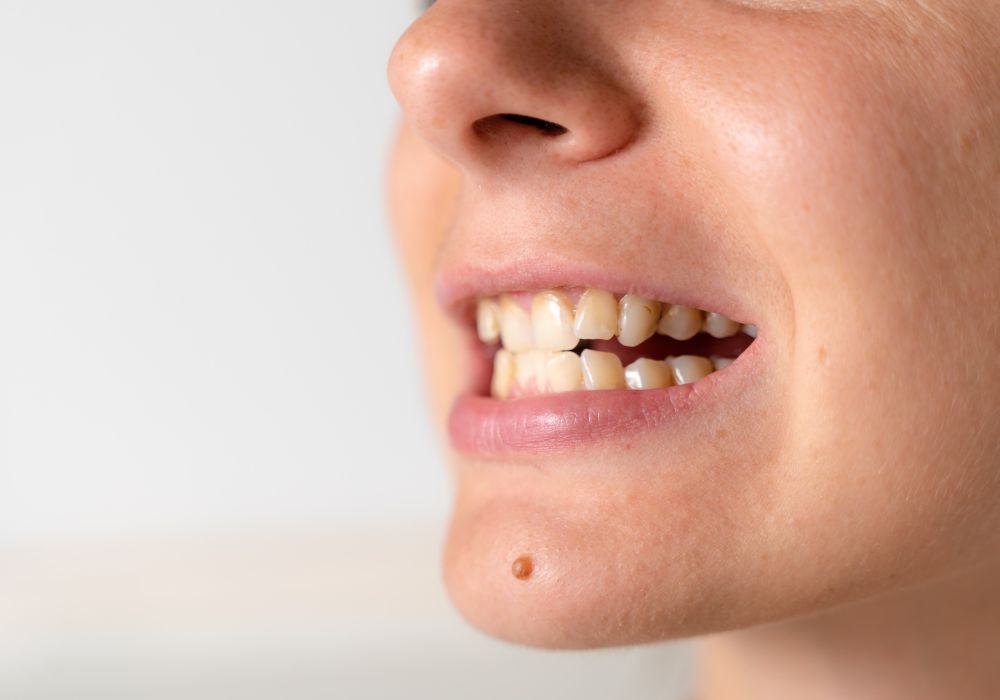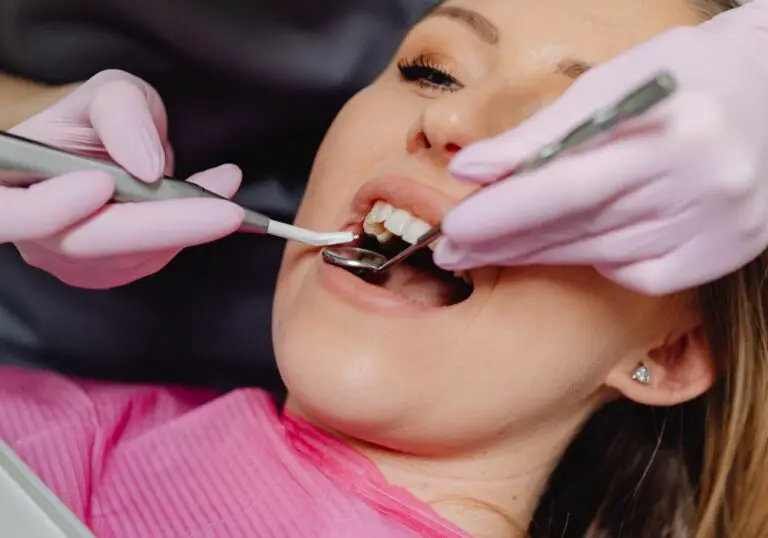Do teeth affect jawline? It’s a common question that many people have. The answer is yes, missing teeth can affect the shape of your face and jawline. When you lose teeth, it can cause jawbone loss and facial collapse, which can make your face look sunken and aged.
Your teeth play an important role in supporting the length of your face and the anatomy of your jawbone. Shorter teeth from frequent tooth grinding can trigger facial asymmetry. Shifting teeth can cause a once symmetrical smile to become uneven. In addition, missing teeth can cause your remaining teeth to shift, which can lead to bite problems and further changes in your face shape.
If you’re concerned about the appearance of your jawline, it’s important to take care of your teeth. Regular dental checkups and good oral hygiene can help prevent tooth loss and maintain the structure of your jawbone. In some cases, dental implants or other restorative procedures may be recommended to replace missing teeth and restore the natural shape of your face.
Understanding the Jawline and Teeth Connection

Role of Teeth in Facial Structure
Your teeth play a crucial role in the overall structure of your face, including your jawline. The teeth and the jawbone work together to provide support and shape to your face. The position and alignment of your teeth can affect the shape and size of your jawline.
For example, if your teeth are crooked or misaligned, they can cause your jaw to shift, which can affect the shape of your jawline. On the other hand, if your teeth are properly aligned, they can help to maintain the shape and structure of your jawline.
Impact of Tooth Loss on Jawline
Tooth loss can also have a significant impact on the shape and structure of your jawline. When you lose a tooth, the surrounding bone tissue begins to deteriorate, which can cause your jawbone to shrink and your jawline to recede. This can result in a sunken or collapsed appearance of your cheeks and chin.
Additionally, when you lose a tooth, the surrounding teeth can shift and move, which can further affect the alignment of your jawline. This can cause your jawline to become uneven or asymmetrical.
It is important to replace missing teeth as soon as possible to prevent further damage to your jawbone and jawline. Dental implants and bridges are common options for replacing missing teeth and restoring the shape and structure of your jawline.
In summary, your teeth and jawbone work together to provide support and shape to your face, including your jawline. The alignment and position of your teeth can affect the shape and size of your jawline, and tooth loss can cause your jawline to recede and become uneven. Replacing missing teeth can help to restore the shape and structure of your jawline.
How Dental Issues Affect the Jawline

If you’re concerned about the appearance of your jawline, you may be wondering if your teeth have any impact on it. The answer is yes! Your teeth can play a significant role in the shape and structure of your jawline. In this section, we’ll explore how dental issues can affect your jawline.
Effect of Misaligned Teeth
Misaligned teeth, also known as malocclusion, can cause your jawline to appear uneven or asymmetrical. When your teeth are not properly aligned, they can put pressure on certain areas of your jawbone, causing it to shift and change shape over time.
In some cases, misaligned teeth can also cause your jaw to protrude or recede, altering the overall appearance of your face. This can lead to self-consciousness and a lack of confidence in your appearance.
Fortunately, there are many orthodontic treatments available to correct misaligned teeth and improve the appearance of your jawline. These treatments can include braces, clear aligners, and other specialized appliances.
Consequence of Tooth Decay
Tooth decay, also known as cavities, can also affect the shape and structure of your jawline. When a tooth decays, it can cause the surrounding bone to weaken and deteriorate, leading to a loss of support for your jawline.
Over time, this can cause your jawbone to shrink or recede, altering the appearance of your face and making it appear sunken or hollow. This can also lead to difficulty chewing and speaking, as well as other dental health issues.
To prevent tooth decay and preserve the shape of your jawline, it’s important to maintain good oral hygiene habits, such as brushing and flossing regularly and visiting your dentist for regular check-ups and cleanings.
In conclusion, dental issues can have a significant impact on the appearance and structure of your jawline. By addressing misaligned teeth and preventing tooth decay, you can improve the overall health and appearance of your smile and jawline.
Orthodontics and Jawline Enhancement
If you’re looking to improve your jawline, orthodontic treatment may be a viable option for you. Orthodontics can not only straighten your teeth but also improve your bite, which can have a significant impact on your jawline.
Braces and Aligners
Braces and aligners are the most common orthodontic treatments used to straighten teeth and improve your bite. By correcting the alignment of your teeth, braces and aligners can help to improve the appearance of your jawline.
Braces work by applying gentle pressure to your teeth over a period of time, gradually moving them into their correct positions. Aligners, on the other hand, are clear plastic trays that fit over your teeth and are changed every few weeks to gradually shift your teeth into place.
Both braces and aligners can help to improve your jawline by correcting issues such as overbites, underbites, and crossbites. By improving the alignment of your teeth, braces and aligners can help to create a more symmetrical and defined jawline.
Jaw Surgery
In some cases, orthodontic treatment alone may not be enough to correct severe jaw misalignments. In these cases, jaw surgery may be necessary to achieve the desired results.
Jaw surgery, also known as orthognathic surgery, is a procedure that involves repositioning the upper or lower jaw to correct severe misalignments. The surgery is usually performed by an oral and maxillofacial surgeon and can take several hours to complete.
While jaw surgery is a more invasive option than braces or aligners, it can have a significant impact on the appearance of your jawline. By correcting severe jaw misalignments, jaw surgery can help to create a more defined and symmetrical jawline.
In conclusion, orthodontic treatment can be an effective way to improve the appearance of your jawline. Whether you opt for braces, aligners, or jaw surgery, working with an experienced orthodontist can help you achieve the results you desire.
Preventive Measures for Maintaining Jawline

Maintaining a sharp jawline is not just about having strong facial muscles, but also about having healthy teeth and gums. Here are some preventive measures that you can take to maintain a good jawline:
Regular Dental Check-ups
Regular dental check-ups are essential for maintaining good oral hygiene and preventing dental problems. Your dentist can detect any dental problems early on and provide treatment before they worsen. Additionally, regular dental check-ups can help prevent gum disease, which can lead to tooth loss and bone loss in the jaw.
Healthy Oral Hygiene Habits
Healthy oral hygiene habits are crucial for maintaining good dental health and preventing dental problems. Here are some healthy oral hygiene habits that you can adopt:
- Brush your teeth twice a day with a fluoride toothpaste.
- Floss at least once a day to remove food particles and plaque from between your teeth.
- Use an antiseptic mouthwash to kill bacteria and freshen your breath.
- Avoid sugary and acidic foods and drinks, which can erode your tooth enamel and cause tooth decay.
- Chew sugar-free gum to stimulate saliva production, which can help neutralize acid and prevent tooth decay.
- Drink plenty of water to keep your mouth hydrated and prevent dry mouth, which can lead to bad breath and tooth decay.
By adopting these preventive measures, you can maintain good dental health and prevent dental problems that can affect your jawline.
Frequently Asked Questions
Can missing teeth cause jaw problems?
Yes, missing teeth can cause jaw problems. When a tooth is lost, the jawbone in that area can begin to deteriorate, causing the surrounding teeth to shift and the bite to become misaligned. This can lead to problems such as jaw pain, headaches, and difficulty chewing.
Will dental implants lift my face?
Dental implants can help restore missing teeth and prevent further jawbone deterioration, but they will not lift your face. The shape of your jawline is determined by the underlying structure of your facial bones and genetics, not by your teeth.
Does crooked teeth affect face shape?
Crooked teeth can affect the appearance of your smile, but they do not necessarily affect your face shape. However, if crooked teeth are causing bite problems, this can lead to jaw pain and other issues that can affect the shape of your face.
Can facial collapse be fixed?
Facial collapse, which can occur when multiple teeth are missing, can be fixed with the help of dental implants or other restorative treatments. These treatments can help restore the structure of the jawbone and prevent further deterioration.
Does removing wisdom teeth change face shape?
Removing wisdom teeth does not directly change face shape. The shape of your jawline is determined by the underlying structure of your facial bones and genetics, not by your teeth. However, if wisdom teeth are causing problems such as overcrowding or impacted teeth, their removal can help prevent further issues.
Can bad teeth affect jawline?
Bad teeth, such as those that are decayed or missing, can affect jawline by causing jawbone deterioration and shifting of the surrounding teeth. This can lead to problems such as jaw pain and difficulty chewing. Restorative treatments such as dental implants can help prevent further deterioration and restore the structure of the jawbone.







